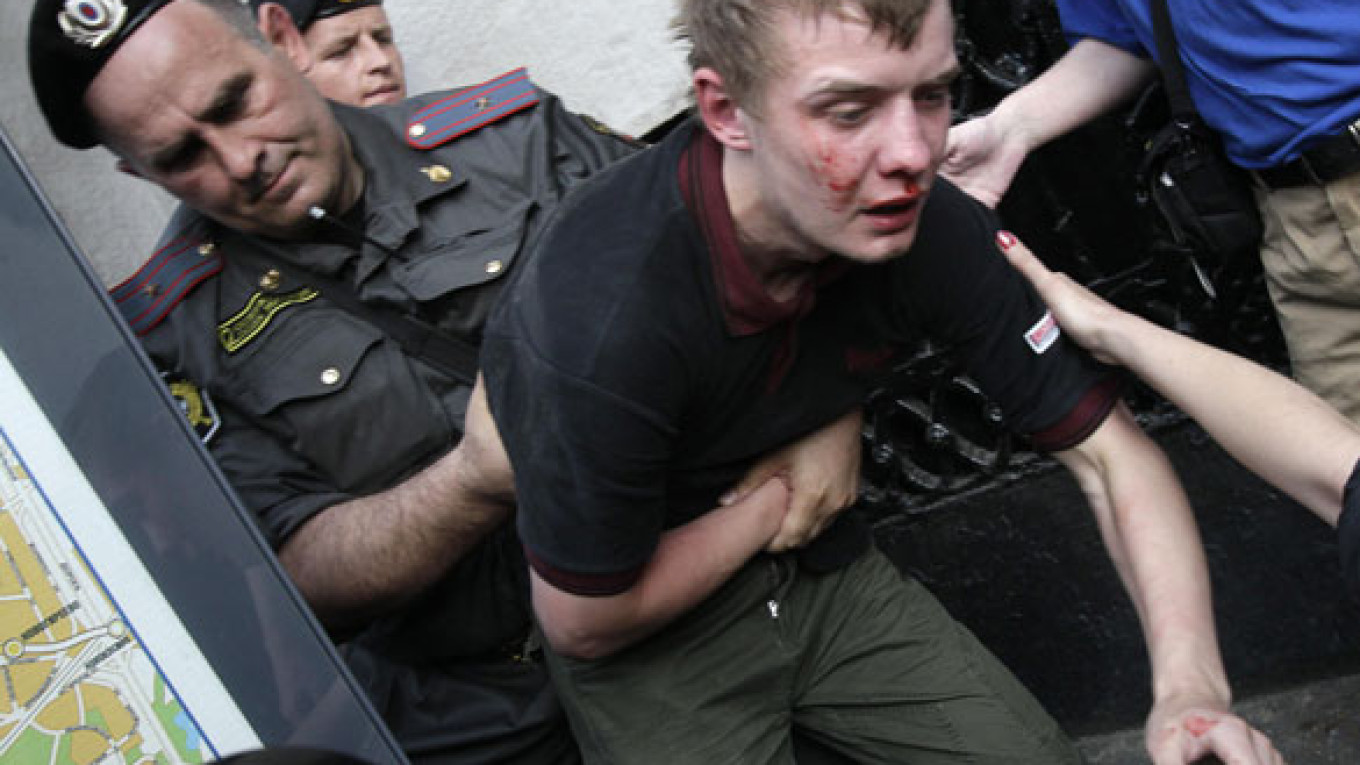Opposition activists said Tuesday that Moscow police officers attacked about two dozen people at and after an unauthorized anti-Kremlin protest, breaking the arm of an activist reporter and manhandling a World War II veteran.
Hundreds of people rallied outside the Mayakovskaya metro station late Monday in defense of their constitutional right to free assembly. Police, who cracked down on the protesters after about an hour, said they detained 152.
Policemen beat at least 23 detainees, including a reporter for Gazeta.ru who will need a costly surgery on his broken arm, at the Zamoskvorechye police station, the opposition web site Kasparov.ru said.
The reporter, Alexander Artemyev, took part in the rally as a member of the Solidarity movement, but his employer will still sue police over his broken arm, Gazeta.ru editor Mikhail Mikhailin told Ekho Moskvy radio.
Police began beating the detainees, who were kept outside the police station, after one of them managed to escape, protester Ilya Kolmanovsky wrote on his blog on Snob.ru.
Vladimir Burtsev, a World War II veteran, posted a YouTube video saying a police officer tore off his ribbon bar after he refused to leave the rally.
Zamoskvorechye police chief Alexander Khavkin denied the beatings, Kasparov.ru reported.
Police said about 500 people took part in the rally, while opposition activists and a Moscow Times reporter who attended the event put the number at closer to 1,000.
The crackdown came two days after Prime Minister Vladimir Putin told a meeting with St. Petersburg intelligentsia that such rallies should be allowed to take place, but without hindering other people. His comments raised hopes that Monday's protest, which was also held in 39 other cities, could be staged peacefully despite a ban from local authorities. But Putin's spokesman Dmitry Peskov said Sunday that the prime minister's words did not offer anyone a license to rally.
"Putin voiced the long-time position of the federal authorities. It is up to regional authorities whether to allow a rally or not," said Tatyana Stanovaya, an analyst with the Center of Political Technologies.
Eduard Limonov, a leader of the Other Russia opposition movement, wrote on his LiveJournal blog that "the beatings were decided before" Putin made his remarks. He said Moscow police chief Vladimir Kolokoltsev and Moscow police chief spokesman Viktor Biryukov had decided "to shun responsibility" for the crackdown by going on vacation a few days before the rally.
The Other Russia will try to convince all detainees to sue, Limonov told Interfax.
City officials banned the rally on Triumfalnaya Ploshchad, saying an authorized pro-Kremlin rally was already scheduled to take place instead.
Preventing unwanted public gatherings by holding official rallies is a well-known tactic. In his 2000 book of interviews, “From the First Person. Conversations with Vladimir Putin,” Putin admitted to using it himself when working in the St. Petersburg administration in the 1990s.
Gennady Gudkov, a senior Just Russia official, said Tuesday that his party planned to introduce a bill in the fall that would make it impossible to ban rallies. He said local authorities abuse their power by trying to prevent rallies and that crackdowns “harm the image of Russia as a democratic country,” Interfax reported.
A Message from The Moscow Times:
Dear readers,
We are facing unprecedented challenges. Russia's Prosecutor General's Office has designated The Moscow Times as an "undesirable" organization, criminalizing our work and putting our staff at risk of prosecution. This follows our earlier unjust labeling as a "foreign agent."
These actions are direct attempts to silence independent journalism in Russia. The authorities claim our work "discredits the decisions of the Russian leadership." We see things differently: we strive to provide accurate, unbiased reporting on Russia.
We, the journalists of The Moscow Times, refuse to be silenced. But to continue our work, we need your help.
Your support, no matter how small, makes a world of difference. If you can, please support us monthly starting from just $2. It's quick to set up, and every contribution makes a significant impact.
By supporting The Moscow Times, you're defending open, independent journalism in the face of repression. Thank you for standing with us.
Remind me later.


